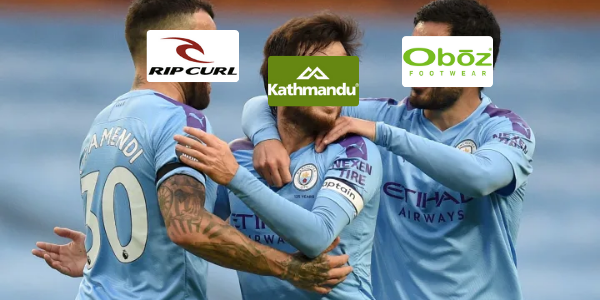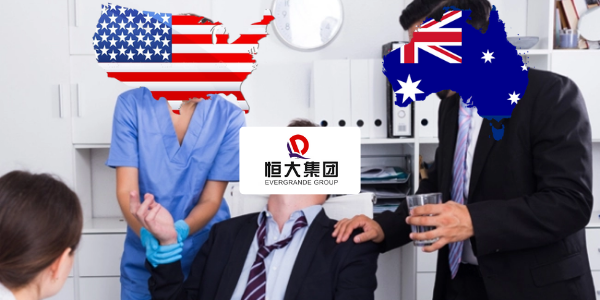Get smarter than your boss in 3 minutes with today's business news.
👀 Kathmandu faces tough retail conditions well into 2022
🚨 Major Chinese property developer Evergrande could cause a financial earthquake
🔙 Afterpay goes retro with its latest app feature
Hey hey Flux fam!
Have you been playing our Flux daily 1 min quiz?!
The Fluxxer with the fastest fingers - and biggest brain - wins a $100 Amazon voucher. It's super easy.
👀 Kathmandu faces tough retail conditions well into 2022
🚨 Major Chinese property developer Evergrande could cause a financial earthquake
🔙 Afterpay goes retro with its latest app feature
Move over blue tick on Twitter. Gig workers on Airtasker will be able to apply for a vaccination badge if they’re double vaxxed. These are the real 'verified' heroes now.

Background: Kathmandu is the Aussie retailer known for its big stores and even bigger puffer jackets. It also owns surf brand Rip Curl, and US hiking shoe brand Oboz.
What happened: Like a lot of retailers, Kathmandu has had a pretty tough year. Around the world, they lost 13,000 trading days in the 2020-21 financial (adding up all the stores).
What else: Unsurprisingly, they had some weak results for the 12 months ending July. And, it reckons things will only get worse for the first-half of the 2022 financial year. But the retailer hopes that as countries come out of lockdown, things will brighten up.
💡Seasonal risk is a term used for businesses that make a significant amount of their revenue in one particular season of the year. Like ski resorts in winter, or ice cream stores in summer.
💡Puffer jackets are great for winter...but they only get ya through one season. And being seasonal can create all sorts of problems, like warehousing and cash flow issues. And these are risks Kathmandu has faced from its inception in 1987, up until its first acquisition in 2018.
💡 Buying Oboz and Rip Curl meant Kathmandu suddenly had access to other global companies that already had a massive footprint across the globe. This helped diversify their product...as well as their geographic location. Bye-bye winter sales, hello 24/7 cash. Although, there's nothing like a global pandemic to foil your plans.

Background: Evergrande is one of China's biggest real estate developers, and it's also one of the biggest companies in the world. They've got 1.4 million apartments under development (which is more in development than Australia has full stop).
What happened: But it's into more than just property. Evergrande is also involved in electric vehicle production, film and TV production, life insurance...and it owns a whole football team. Why not?!
What else: It's China's most indebted developer...with a casual US$300 billion worth of liabilities. And there were major concerns it would not be able to repay its debts. Yikes. Now, it's reached a last minute deal to repay some of its debts - which has reduced concerns of an immediate collapse.
💡China could be about to have its very own Lehman Brothers moment. Let's rewind to 2008. "Low" by Flo Rida was #1, The Dark Knight smashed the box office, and US investment bank, Lehman Brothers, collapsed.
💡Just like COVID-19 is highly contagious...financial issues can also be caught, thanks to globalisation - aka the link between economies across the world. So when Lehman Brothers collapsed, everyone felt it. Just like Melbourne's earthquake yesterday.
💡Already, the Evergrande saga is having a ripple effect on economies across the globe. US stocks dropped, so did Bitcoin - and even the ASX.if it falls completely, history could repeat itself.

Background: Afterpay is the buy now, pay later company that lets customers purchase an item, and pay it back in interest-free instalments. They were recently acquired by Square in a monster deal, and they're launching a new app called Money.
What happened: The Money app offers users a savings account with a 1% interest rate, and a debit card, all via Westpac. But the latest feature, called Retro Afterpay, will let users borrow up to $200 for retrospective purchases.
What else: Here's how it works: if you've made an outright purchase in the last 72 hours, Afterpay will let you borrow up to $200 to pay off that purchase. Then, you pay back the $200 in four instalments, like any Afterpay purchase.
💡As BNPL platforms become more popular, we're seeing a structural shift away from the credit economy (i.e. credit cards) to the debit economy.
💡In the US, the use of debit surged 21% in October last year, while credit declined 4%, compared to the same time the previous year. In Australia, the average credit card balance in October 2020 was close to a 14-year-low.
💡Young people, particularly women, are driving this shift. This cohort are choosing BNPL schemes over credit cards. But the real question is, is Afterpay just creating another way for people to delay payments that need to be paid? At what point are consumers going to find themselves with too much debt?
Sign up for Flux and join 100,000 members of the Flux family